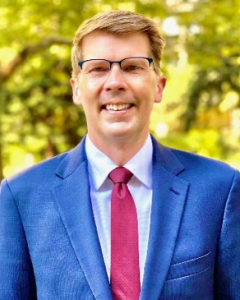
Keith Cruise, Ph.D., MLS
Co-Principal Investigator and Co-Director
cruise@fordham.edu
Keith Cruise holds a Ph.D. in clinical psychology from the University of North Texas, a Masters of Legal Studies degree from the University Nebraska, and is a licensed clinical psychologist in Connecticut and New York. Dr. Cruise has over 20 years of experience providing consultation, training, and technical assistance to local and state juvenile justice systems with a particular emphasis in implementing trauma-informed screening, assessment, and case planning. Dr. Cruise has received grant funding from multiple federal agencies to examine the effectiveness of enhanced mental health screening for poly-victimization, trauma-informed case planning, and the impact of trauma screening on service delivery and legal outcomes for youth with justice system involvement. He also conducts forensic evaluations and has testified in juvenile and adult criminal courts across the country. As a CTRJJ Co-Director, Dr. Cruise works with all CTRJJ faculty and partners to support CTRJJ initiatives and is responsible for the CTRJJ performance evaluation.
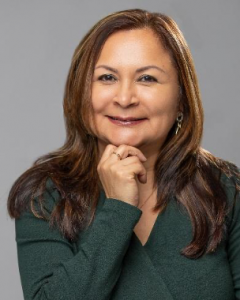
Rocio Chang-Angulo, Psy.D.
Co-Director and Co-Principal Investigator
chang@uchc.edu
Rocio Chang-Angulo, Psy.D., is an Assistant Professor of Psychiatry at the University of Connecticut Health Center and has served as the Associate Director of the CTRJJ since its founding, served on the NCTSN National Steering Committee (2017-2019) and NCTSN collaborative work groups on Partnering with Youth and Families (as Co-Chair), Latin America Children and Families, Culture Consortium, and Community Violence, and advisory Boards of community organizations providing peer substance abuse and mental health recovery services. Rocio acts as both a Co-Director and Co-Principal Investigator of the CTRJJ. Dr. Chang-Angulo has published on childhood and adult trauma and presented at various regional and national scientific meetings. She has been a resource to Latino organizations. Dr. Chang served as Director of the Substance Abuse and Mental Health Services Administration (SAMHSA)-funded Capitol Region Mental Health Center Women’s Diversion Program, working with Dr. Julian Ford to adapt Trauma Affect Regulation Guidelines for Education and Therapy (TARGET) to complement the Relational-Cultural treatment and rehabilitation model she initiated, and conducted TARGET with adolescents. She is a trainer of the Wellness Recovery Action Plan (WRAP), Think Trauma Curriculum, Restorative Justice Practices, and Peer Support Services, and is herself trained in numerous other practices and interventions. She was a faculty member of the Complex Trauma Treatment Network, working with a large Puerto Rico Learning Community, including all Juvenile Detention Facilities on the island. Dr. Chang has adapted and translated materials about Developmental Trauma Disorder and trauma-informed services for a number of audiences. She co-developed a Spanish curriculum on the intersection of domestic violence, mental health, and trauma with the Connecticut Coalition Against Domestic Violence and the National Alliance of Mental Illness. Dr. Chang-Angulo serves on several National Child Traumatic Stress Network committees and is a peer reviewer of the Journal of Racial and Ethnic Health Disparities.

Julian D. Ford, Ph.D., A.B.P.P.
Co-Principal Investigator and Co-Director
jford@uchc.edu
Julian D. Ford, Ph.D., A.B.P.P. is a board certified clinical psychologist and Professor of Psychiatry and Law at the University of Connecticut where he is the Chair of the School of Medicine and Dental Medicine Institutional Review Boards, and Director Emeritus and Senior Advisor for the Center for Trauma Recovery and Juvenile Justice (2012-2026) and Director of the Center for the Treatment of Developmental Trauma Disorders (2016-2027) in the National Child Traumatic Stress Network. Dr. Ford is past President of the International Society for Traumatic Stress Studies, and a Fellow of the American Psychological Association. He is an Associate Editor for the Journal of Trauma and Dissociation and European Journal of Psychotraumatology and on the Editorial Board of six peer review Journals. He has published more than 325 articles and book chapters and is the author or editor of 10 books, including Treating Complex Traumatic Stress Disorders in Children and Adolescents: Scientific Foundations and Therapeutic Models, Posttraumatic Stress Disorder, 2nd Edition, Treating Complex Traumatic Stress Disorders in Adults, 2nd Edition, and Critical Moments: Transforming Crises into Turning Points in Psychotherapy. Dr. Ford is the Principal Investigator for the national Developmental Trauma Disorder Field trial research study, and developed and has conducted randomized clinical trial and effectiveness studies with the Trauma Affect Regulation: Guide for Education and Therapy (TARGET©) model for youths and adults with complex traumatic stress disorders.
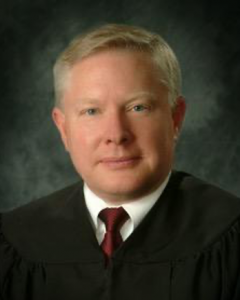
Judge Michael L. Howard, Ret. B.A., J.D.
CTRJJ Faculty
michaellloydhoward@gmail.com
The Honorable Michael L. Howard retired December 31, 2016, after thirty years at Stark County Court of Common Pleas, Family Court Division, in Canton, Ohio. He was elected Judge in 2004, and presided over both the juvenile and domestic relations cases. In the juvenile division, approximately 4,200 cases—including abuse, neglect, dependency, and delinquency—are heard annually. Judge Howard is a graduate of Ohio Wesleyan University and The University of Akron School of Law. He was a Certified Public Accountant and Senior Tax Manager at the international public accounting firm of Deloitte in Seattle, Washington. While living in Seattle, Judge Howard was a volunteer Guardian ad Litem for abused and neglected children. Since 2001, Judge Howard has been mobilizing development of effective resources for children and families affected by trauma, and has incorporated trauma screening at Stark County’s Juvenile Court. In retirement, Judge Howard is continuing in his role as a community convener focusing on making all child-serving systems trauma-responsive, increasing community awareness of trauma and its impact, and promoting community-wide adoption of evidence-based treatment for trauma victims. Judge Howard is an active community volunteer, focusing primarily on programs that help children achieve success and avoid delinquent behavior. Judge Howard serves on the Advisory Boards of the National Child Traumatic Stress Network, the Center for Resilient Families at Arizona State University, the National Native Children’s Trauma Center at the University of Montana, and the Center for Trauma Recovery and Juvenile Justice at the University of Connecticut. The Judge has co-authored several articles and reference guides on trauma and juvenile justice, and is a co-author of the NCTSN’s Trauma Informed Juvenile Court Self-Assessment.
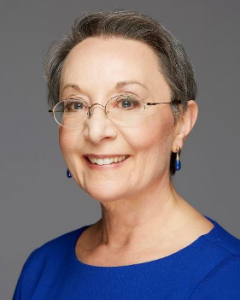
Patricia K. Kerig, Ph.D.
CTRJJ Faculty
p.kerig@utah.edu
Dr. Kerig serves as faculty of the CTRJJ and offers expertise on the topics of uncovering the developmental processes linking trauma to youth justice involvement, trauma-informed interventions, trauma and youth gangs, and girls in the justice system.
Patricia K. Kerig, PhD, received her doctorate from the University of California at Berkeley and currently is a Professor of Clinical Psychology at the University of Utah. Her research and clinical interests focus on identifying and intervening with the underlying processes that account for the link between trauma exposure and youth involvement in the juvenile justice system.

Julie Kaplow, Ph.D., ABPP
CTRJJ Faculty
jkaplow@mmhpi.org
Julie Kaplow, Ph.D., ABPP, is a licensed clinical psychologist, board certified in Clinical Child and Adolescent Psychology. She serves as Executive Vice President of Trauma and Grief Programs and Policy at the Meadows Mental Health Policy Institute and Executive Director of the Trauma and Grief (TAG) Center at The Hackett Center for Mental Health in Houston. Dr. Kaplow is also Executive Director of the TAG Center at Children’s Hospital New Orleans and Professor of Psychiatry at Tulane University School of Medicine. She is also CEO of the Lucine Center for Trauma and Grief, a group practice that provides no-cost teletherapy to youth exposed to traumas and losses across the states of Texas and Louisina. In these roles, she oversees the development and evaluation of treatments for traumatized and bereaved youth and disseminates trauma- and bereavement-informed “best practices” to community providers nationwide. Following tragedies such as Hurricane Harvey and the Santa Fe school shooting, Dr. Kaplow and her team provided evidence-based risk screening and interventions to impacted children and families. More recently, they have been conducting and coordinating trainings for school- and community-based clinicians throughout Uvalde, Texas following the Robb Elementary School shooting.
Dr. Kaplow has published widely on the topics of childhood trauma and grief and has served as Principal Investigator on numerous grant-funded programs focused on enhancing resilience in youth exposed to adversity. She is lead author of Multidimensional Grief Therapy, co-author of Trauma and Grief Component Therapy for Adolescents, and co-author of Trauma Systems Therapy. Dr. Kaplow has served as a consultant to the DSM-5 Sub-Work Group on Prolonged Grief Disorder, the ICD-11 Work Group on Disorders Associated with Stress, the National Academy of Medicine (Scientific Advisory Council on Child Death), and the Mass Violence and Children Working Group of the FBI.
Prior to joining the Meadows Mental Health Policy Institute, Dr. Kaplow served as Chief of Psychology and Vice Chair for Behavioral Health at Texas Children’s Hospital/Baylor College of Medicine. She received her BA in Psychology from the University of Michigan and her PhD in Clinical Psychology from Duke University. She completed her internship at Boston Children’s Hospital/Harvard Medical School followed by postdoctoral training at the Center for Medical and Refugee Trauma at Boston Medical Center.

Robin Jenkins, Ph.D.
CTRJJ Faculty
robin.jenkins@unc.edu
Robin Jenkins, PhD, is with the Impact Center at Frank Porter Graham Child Development Institute at the University of North Carolina in Chapel Hill. A senior implementation scientist, Dr. Jenkins utilizes implementation research and practice to motivate and engage system leaders and organizations as they consider new programs, policies, or practices, applying implementation science strategies to improve adoption and sustainment of evidence-supported initiatives. His career spans roles associated with prevention and implementation science, public health, child welfare, juvenile justice and public safety, behavioral health, and substance use treatment systems. Dr. Jenkins has served as the former Chair of the National Coalition of Juvenile Justice, a member of the National Juvenile Justice Network’s Executive Committee, was a governor appointed member of the Federal Advisory Committee on Juvenile Justice (OJJDP) and the North Carolina Governor’s Crime Commission, State Advisory Group (on Juvenile Justice) Chair, NC Sentencing and Policy Advisory Commission, and NC’s Criminal Justice Information Network, and served on several other state and local boards and commissions. He is a founding board member of the National Prevention Science Coalition to Improve Lives. A former Chief Deputy Secretary in the NC Dept. of Juvenile Justice and Delinquency Prevention, and Deputy Director in the NC Dept. of Public Safety-Division of Juvenile Justice, Dr. Jenkins co-led large scale systems involving the full continuum of prevention, intervention, and post-release juvenile justice resources in North Carolina. He focused heavily on work to integrate and leverage cross-system supports in service to all children, families, and communities. These efforts required extensive cross- and multi-agency state and local system collaborations, along with innovative policy and administrative solutions.
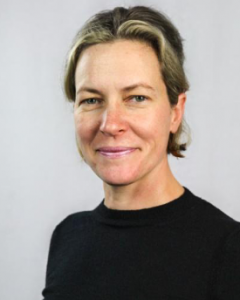
Karli J. Keator, M.P.H., M.S.W., C.G.S.
CTRJJ Faculty
karli@wkdstrategies.com
Karli J. Keator, MPH, MSW, CGS, has over 17 years of experience supporting systems and practice improvement initiatives that better life opportunities for youth with behavioral health conditions. In all aspects of her work, she invites reflection on the current state of practice through equal inclusion of data and lived experience; facilitates planning and implementation processes that reflect the empirical knowledge of what interventions work, for whom, and under what circumstances; and supports a workforce to engage with under-resourced and vulnerable communities authentically and skillfully. Ms. Keator provides consultation to enhance referral networks through intervention and assets mapping, and supports communities develop or enhance a behavioral health crisis response continuum for youth. She was formerly the Director of the National Center for Youth Opportunity and Justice and Vice President at Policy Research Associates, Inc.
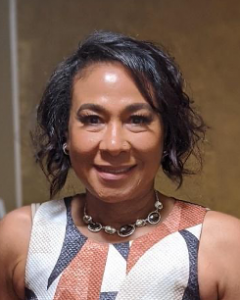
Monique Khumalo, Ph.D.
CTRJJ Faculty
monique.khumalo@youthtjs.com
Monique Khumalo holds a doctorate degree in Child Clinical Psychology from The Ohio State University. She is the owner of Youth Trauma & Justice Solutions, a consulting firm dedicated to assisting child-serving agencies in achieving trauma-responsive culture change and overall system reform. She is a member of the National Child Traumatic Stress Network (NCTSN) and has served on NCTSN’s Steering Committee, Affiliate Advisory Board, Community Violence, Complex Trauma, and Justice Consortium Committees. She co-authored a training curriculum with NCTSN entitled “Think Trauma: a training for staff in Juvenile Justice and Residential Settings (2012) updated in 2020 to Think Trauma: A training for working with justice involved youth. In 2006, while serving as Deputy Director of Treatment and Rehabilitation Services for the Ohio Department of Youth Services she initiated the Department’s first comprehensive trauma-focused intervention program designed to provide training to staff, treatment programming for youth and trauma-responsive modifications to environments, policies and practices. This initiative is detailed in an article entitled “The Value of Implementing TARGET within a Trauma-Informed Juvenile Justice Setting”, which was published in a special issue of the Journal of Child and Adolescent Trauma in August of 2012. She also served as co-author of a research article that expanded the initial work to determine the effectiveness of implementing staff training, using Think Trauma and another trauma-focused model for youth– Trauma and Grief Components Therapy for Adolescents in multiple JJ sites using a learning collaborative model. That work is captured in a 2016 article entitled “Implementing Trauma and Grief Component Therapy for Adolescents and Think Trauma for Traumatized Youth in Secure Juvenile Justice Settings.”
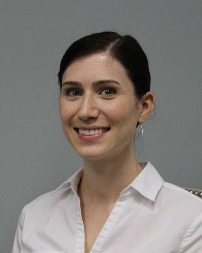
Katy Reid, M.S.
CTRJJ Faculty
katy@advancedtrauma.com
Katy Reid, LPC, currently serves as the Chief Executive Officer for Advanced Trauma Solutions Professionals, LLC (ATS Pro), the dissemination organization for TARGET (Trauma Affect Regulation: Guide for Education and Therapy), an evidence-based treatment approach for traumatic stress disorders. In her role as CEO, Katy has taken the lead in developing, testing, and implementing programs and operational systems; training, certifying, and supervising TARGET trainers, QA coaches; and resource development. Katy has overseen the training of 3,000 professionals in the corrections, child welfare, homelessness, and behavioral health fields in evidence-based, trauma-informed practices.
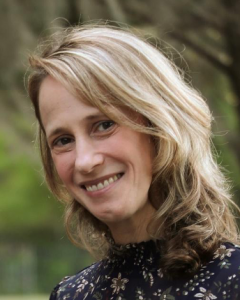
Carly Baetz, Ph.D., J.D.
CTRJJ Faculty
carly.baetz@nyumc.org
Dr. Carly Baetz is a Clinical Psychologist and Assistant Professor in the Department of Child and Adolescent Psychiatry at the NYU School of Medicine. She was the Project Director and Principal Investigator on a federally-funded grant (SAMHSA) to expand trauma-informed services in New York City juvenile detention facilities and has more than a decade of experience working with youth and families in the juvenile justice and child welfare systems. Her current work focuses on treating justice-involved youth with histories of trauma exposure, conducting research on the implementation of trauma-informed practices in the juvenile justice system, and providing trauma-informed training and consultation to juvenile justice professionals. Prior to becoming a psychologist, Dr. Baetz represented youth in child protective and juvenile delinquency cases as a staff attorney at the Legal Aid Society, Juvenile Rights Practice in New York, NY.
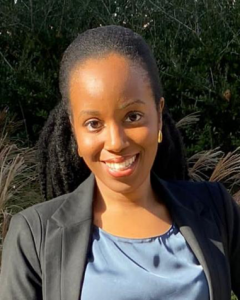
Lena Harris, M.S.W.
CTRJJ Faculty
Lena Harris, MSW, is an implementation specialist with The Impact Center at the UNC Frank Porter Graham Child Development Institute. Lena has been a strong advocate for children and youth in foster care for several years. Prior to joining the Impact Center at FPG, she worked as an implementation specialist with Fostering Health NC, a program of the North Carolina Pediatric Society where she collaborated with multiple state, county, and community stakeholders to advocate for medical home care for children and youth in foster care. She also has direct practice experience working with children, youth, and families through her time as a county in-home and foster care social worker. Lena earned her Master of Social work from the University of North Carolina at Chapel Hill, as a member of the Child Welfare Education Collaborative. She graduated with her Bachelor of Arts in Psychology from Johns Hopkins University in Baltimore, Maryland. Lena is passionate about empowering children and families to achieve improved wellbeing outcomes, with a focus on those involved with the child welfare system and the systems that interact with it.

Regina Mitchell
CTRJJ Faculty
ginamitch15@gmail.com
Regina Mitchell was the Chief Policy and Programs Officer at the Center for Children’s Law and Policy (CCLP). In this capacity, Regina led and managed CCLP’s programmatic work, and supervised program and policy staff. Regina also led CCLP’s partnership with the Annie E Casey Foundation to include the Juvenile Detention Alternatives Initiative (JDAI), Probation Transformation, and Diversion efforts.
With over 25 years of experience in the field, Regina is an avid speaker and assists law enforcement agencies and jurisdictions to reduce racial and ethnic disparities in the youth legal system, improve racial equity at the arrest and diversion decision points, and improve conditions of confinement.
Before joining CCLP, Regina served as the State JDAI Administrator for the Ohio Department of Youth Services. Regina has adult and youth community corrections experience. She has experience as a gang investigator with the Ohio Attorney General’s Office and teaching experience at Ohio Dominican University in Columbus, Ohio. Her experience also includes case management, youth outreach and mental health.
Regina received a Thrasher Award for outstanding service in the field of criminal gangs from the National Gang Crime Research Center.
Regina is PROSCI® Change Management Certified and holds a Lean Six Sigma Black Belt.
Regina received her Master’s Degree in Criminal Justice Administration from Tiffin University and a bachelor’s degree from The Ohio State University.

Gilda F. Rodríguez Díaz, Psy.D.
CTRJJ Faculty
grodriguez1@albizu.edu
Dr. Gilda F. Rodríguez-Díaz is a licensed psychologist with over 15 years of experience in this field. She is the Director of the Albizu Clinic, and the Co-Founder and Co-Director of the Center for Trauma, Stress, and Health (CTSH) at Albizu University in San Juan. Dr. Rodríguez-Díaz has extensive experience in managing, implementing, and disseminating evidence-based interventions across the island of Puerto Rico. For the last decade, she has offered services to children, women, and families who have been victims of sexual violence and other traumatic experiences. She fostered strong ties with community organizations that provide diverse services to underserved populations in Puerto Rico, leading projects to facilitate capacity building in trauma-informed evidence-based practices and Trauma-Informed Pediatric Care. She has a depth of experience leading post-disaster interventions and supported efforts in communities and initiatives on the island for the past 5 years, with significant expertise in community-led initiatives, leadership, enthusiasm, and personal commitment. She was awarded the Visionary Voice Awards 2017 offered by the National Sexual Violence Resource Center in conjunction with Sexual Assault Awareness Month (SAAM) to recognize her creativity, outstanding and hard work to end sexual violence. Gilda is an active member of the National Committee on Sexual Assault of Puerto Rico Coalition Against Domestic Violence and Sexual Assault and the Puerto Rico Evidence-Based Practices Board, among other professional and community organizations. Dr. Rodríguez-Díaz is committed with facilitative training for community organizations, government, and federal agencies, and had presented at national and international conferences on topics related to sexual violence, childhood adverse experiences, trauma-informed-care, evidenced-based practices, among other trauma-related topics.
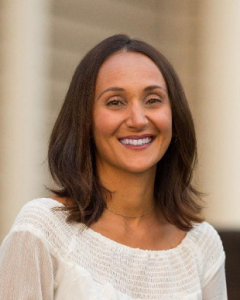
Amanda D. Zelechoski, J.D., Ph.D., ABPP
CTRJJ Faculty
amanda.zelechoski@pnw.edu
Dr. Amanda Zelechoski is a licensed clinical and forensic psychologist and attorney, specializing in trauma. She is a Professor of Psychology and Director of Clinical Training at Purdue University Northwest, and is board certified in Clinical Child and Adolescent Psychology, having worked clinically with adults, children, and families in a variety of settings. As Director of the Psychology, Law, and Trauma Lab, her research examines the intersection between psychology, law, and trauma, particularly for underserved populations. Most recently, she conducted research on the impact of the COVID-19 pandemic on children and parents, which led to the creation of Pandemic Parenting, a free digital resource hub and non-profit organization. In addition to her roles at Purdue Northwest, Dr. Zelechoski provides training and consultation to mental health, education, and legal agencies. Her teaching, research, and community outreach efforts have won numerous awards, including, most recently, the APA Division 56 Award for Media Contributions to the Field of Trauma Psychology, the APA Division 37 Child and Family Citizen Psychologist Award, and the Indiana Psychological Association Award for Distinguished Community Service in Psychology. Dr. Zelechoski’s work has also been featured in most major news and media outlets, including ABC News, CNN, NBCLX, The Washington Post, The New York Times, AP News, Parents, National Geographic, WebMD, and VICE.

Riley Theriault
CTRJJ Research Assistant
rtheriault@uchc.edu
Riley Theriault holds a BA in Psychology and a BA in English from Bates College located in Lewiston, Maine. Riley acts as a Psychiatry Research Assistant at UConn Health for the Center for Trauma Recovery and Juvenile Justice (CTRJJ). Her research experience includes her undergraduate senior thesis, Observing the Role of Diagnosis on the Relationship with Religion in Catholic People with Mental Health Diagnoses, and volunteer research of Positive Psychology regarding well-being and belonging in emerging adults.